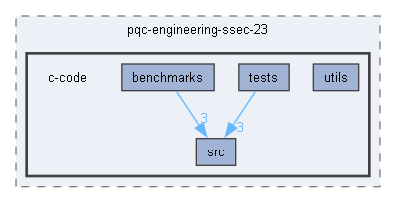Let us walk on the 3-isogeny graph: (Detailed) Build, Test and Benchmarking Framework Documentation
Table of contents
- Introduction
- Build
- Cmake configuration
- Make library targets
- Make test targets
- Tests
- Benchmarking
- Benchmarking script
- Remarks
- Appendix: CPU benchmarking details
- Benchmarking CPU cycles and Execution Time
- References
1. Introduction
In this document, we present detailed instructions of the build, test and benchmarking of our source code. This detailed explanation aims to provide insights of our source code.
In the following sections, the list of all the supported primes is: p254, p255, p381, p383, p398, p511, p575, p592, p765, and p783.
2. Build
The following instructions work on both Linux and MacOS using CMAKE. NOTE: Only Intel x86_64 is currently supported.
2.1. Cmake configuration
First configure the build directory with
pqc-engineering-ssec-23/c-code$ cmake -DCMAKE_BUILD_TYPE=<BUILD_TYPE> -B <folder-build-name>
where <BUILD_TYPE> is either Release or Debug. Optionally, add personal preference to CMAKE such as
-DCMAKE_MAKE_PROGRAM=path/to/ninja -G Ninja
An example of how to build the debug build type is shown below
pqc-engineering-ssec-23/c-code$ cmake -DCMAKE_BUILD_TYPE=Debug -B cmake-build-debug
2.2. Make library targets
Jump into the <folder-build-name> folder and build all target libraries for all supported primes:
pqc-engineering-ssec-23/c-code$ cd <folder-build-name>
pqc-engineering-ssec-23/c-code/<folder-build-name>$ make -j8
Example:
pqc-engineering-ssec-23/c-code$ cd cmake-build-debug
pqc-engineering-ssec-23/c-code/cmake-build-debug$ make -j8
To build target libraries individually, simply run
pqc-engineering-ssec-23/c-code/<folder-build-name>$ make ssec-p<PRIME>
where <PRIME> is one of the supported primes p254, p255, p381, p383, p398, p511, p575, p592, p765, and p783. Example:
pqc-engineering-ssec-23/c-code/cmake-build-debug$ make ssec-p254
2.3. Make test targets
Building all targets from last step will create all test targets as well. To compile specific test target, simply run
pqc-engineering-ssec-23/c-code/<folder-build-name>$ make tests-ssec-p<PRIME>
where <PRIME> is one of the supported primes. Example:
pqc-engineering-ssec-23/c-code/cmake-build-debug$ make tests-ssec-p254
3. Tests
Ctest is supported and can be used to call tests using regex, with the command
pqc-engineering-ssec-23/c-code/<folder-build-name>$ ctest
Example:
pqc-engineering-ssec-23/c-code/cmake-build-debug$ ctest
will run all tests. To run all tests in parallel, run
pqc-engineering-ssec-23/c-code/<folder-build-name>$ make test-parallel
Example:
pqc-engineering-ssec-23/c-code/cmake-build-debug$ make test-parallel
Another way to run the tests is provided by
pqc-engineering-ssec-23/c-code/<folder-build-name>$ ctest -V -R test
4. Benchmarking
For benchmarking, the correct commands must be used when doing the first cmake.
pqc-engineering-ssec-23/c-code$ cmake -DCMAKE_BUILD_TYPE=Debug -DBENCHMARKING=CYCLES -DARCHITECTURE=x8664 -B cmake-build-debug-cycles-x8664
pqc-engineering-ssec-23/c-code$ cmake -DCMAKE_BUILD_TYPE=Release -DBENCHMARKING=CYCLES -DARCHITECTURE=x8664 -B cmake-build-release-cycles-x8664
pqc-engineering-ssec-23/c-code$ cmake -DCMAKE_BUILD_TYPE=Debug -DBENCHMARKING=TIME -DARCHITECTURE=x8664 -B cmake-build-debug-time-x8664
pqc-engineering-ssec-23/c-code$ cmake -DCMAKE_BUILD_TYPE=Release -DBENCHMARKING=TIME -DARCHITECTURE=x8664 -B cmake-build-release-time-x8664
followed by
pqc-engineering-ssec-23/c-code$ cd <folder-build-name>
pqc-engineering-ssec-23/c-code/<folder-build-name>$ make -j8
NOTE: Benchmarking does not work for
pqc-engineering-ssec-23/c-code$ cmake -DCMAKE_BUILD_TYPE=Release -B cmake-build-release
pqc-engineering-ssec-23/c-code$ cmake -DCMAKE_BUILD_TYPE=Debug -B cmake-build-debug
In case you run the benchmarking in either one of these two build modes (without the -DBENCHMARKING and the -DARCHITECTURE flags), you will get the following error:

A successful built that can generate correct benchmarks is shown below.

After building using the correct flags, to run the benchmarks in verbose mode, run
pqc-engineering-ssec-23/c-code/<folder-build-name>$ ctest -V -R bench
Individual test suites can be run similarly as
pqc-engineering-ssec-23/c-code/<folder-build-name>$ ctest -V -R test-ssec-p<PRIME>-fp
or a single test case by calling directly the test app as
pqc-engineering-ssec-23/c-code/<folder-build-name>$ cd tests
pqc-engineering-ssec-23/c-code/<folder-build-name>/tests$ ./tests-ssec-p<PRIME> tests/fp/add_and_sub
To run tests and benchmarks with more iterations, you can modify the number of times each test is evaluated with the following.
pqc-engineering-ssec-23/c-code/<folder-build-name>$ cd tests
pqc-engineering-ssec-23/c-code/<folder-build-name>/tests$ ./tests-ssec-p<PRIME> --iterations 10000
pqc-engineering-ssec-23/c-code/<folder-build-name>/tests$ cd ..
pqc-engineering-ssec-23/c-code/<folder-build-name>$ cd benchmarks
pqc-engineering-ssec-23/c-code/<folder-build-name>/benchmarks$ ./benchmarks/benchmarks-ssec-p<PRIME> # By default 10000
Finally, another way to run the benchmarks is given by
pqc-engineering-ssec-23/c-code/<folder-build-name>$ benchmarks/benchmarks-ssec-p<PRIME> # By default 10000
5. Benchmarking script
A high-level benchmarking script exists in the pqc-engineering-ssec-23/high-level-scripts folder. To run it, first replace the WORKSPACE variable inside benchmark_02_20250408.sh, and then execute (in their respective folders)
pqc-engineering-ssec-23/c-code$ cmake -DCMAKE_BUILD_TYPE=Debug -DBENCHMARKING=CYCLES -DARCHITECTURE=x8664 -B cmake-build-debug-cycles-x8664
pqc-engineering-ssec-23/c-code$ cmake -DCMAKE_BUILD_TYPE=Release -DBENCHMARKING=CYCLES -DARCHITECTURE=x8664 -B cmake-build-release-cycles-x8664
pqc-engineering-ssec-23/c-code$ cmake -DCMAKE_BUILD_TYPE=Release -DBENCHMARKING=TIME -DARCHITECTURE=x8664 -B cmake-build-debug-time-x8664
pqc-engineering-ssec-23/c-code$ cmake -DCMAKE_BUILD_TYPE=Release -DBENCHMARKING=TIME -DARCHITECTURE=x8664 -B cmake-build-release-time-x8664
and
pqc-engineering-ssec-23/high-level-scripts$ mkdir results
pqc-engineering-ssec-23/high-level-scripts$ sudo bash benchmark_02_20250408.sh
This will create the benchmark results inside the high-level-scripts/results folder, with a timestamp.
6. Remarks
- Our ASM implementation is based on [^1].
- The test concerning the 2-isogeny and 3-isogeny chains employs Magma. In particular, after running ctest -V -R test one can verify the correct of the chains by running
magma tests/TEST-<PRIME>-deg2.log
magma tests/TEST-<PRIME>-deg3.log
where <PRIME> is one of the included primes (e.g., see src/asm/pYYY.s or src/parameters/pYYY.h).
7. Appendix: CPU benchmarking details
Our testbed consists of machine with a 12th Gen. Intel(R) Core(TM) i9-12900H CPU and 32 Gb of RAM, running Ubuntu 20.04.6 LTS (64 bits). To avoid the operating system to use multi-thread or additional performance boosts, we disabled the Turbo Boost via the kernel driver
/sys/devices/system/cpu/intel_pstate/no_turbo
and the hyperthread via
/sys/devices/system/cpu/smt/control
where the part of the script concerning disabling both Turbo Boost and hyperthreading is shown below. Note that these boosting disabling commands work in Intel CPUs, and similar ARM instructions or kernel modules are needed in case the benchmarking is desired to be performed in ARM CPUs.
#!/bin/bash
TURBO=/sys/devices/system/cpu/intel_pstate/no_turbo
DISABLE_TURBO=1
HYPERT_CMD=/sys/devices/system/cpu/smt/control
HYPERT_STS=/sys/devices/system/cpu/smt/active
ENABLE_HT=on
DISABLE_HT=off
disableTurbo() {
echo ${DISABLE_TURBO} > ${TURBO}
}
statusTurbo() {
echo -n "Turbo status (0 is enabled): "
cat ${TURBO}
}
disableHyperThread() {
echo ${DISABLE_HT} > ${HYPERT_CMD}
}
echo "Setup benchmark"
#setup benchmark
disableTurbo
disableHyperThread
setPerformance
7.1. Benchmarking CPU cycles and Execution Time
We perform two types of benchmarking: CPU cycles and Execution time, measured in nanoseconds. To measure the CPU cycle count between executions of our tests, we used the rdtsc assembly instruction for Intel architectures.
#if (defined(__GNUC__) || defined(__ICC) || defined(__SUNPRO_C))
&& defined(__x86_64__) && !defined(HAVE_TICK_COUNTER)
typedef unsigned long long ticks;
static __inline__ ticks getticks(void)
{
unsigned a, d;
asm volatile("rdtsc" : "=a" (a), "=d" (d));
return ((ticks)a) | (((ticks)d) << 32);
}
INLINE_ELAPSED(__inline__)
#define HAVE_TICK_COUNTER
#endif
and for the execution time, we use the timespec_get instruction from time.h:
#include <time.h>
int timespec_get(
struct timespec *ts,
int base);
and we use a custom get_nanos function that measures the time in nanoseconds
static unsigned long long get_nanos(void)
{
struct timespec ts;
timespec_get(&ts, TIME_UTC);
return (unsigned long long)ts.tv_sec * \textcolor{blue}{1000000000ull} + ts.tv_nsec;
}
8. References
[^1]: CTIDH: faster constant-time CSIDH. (2021). IACR Transactions on Cryptographic Hardware and Embedded Systems, 2021(4), 351-387. https://doi.org/10.46586/tches.v2021.i4.351-387


